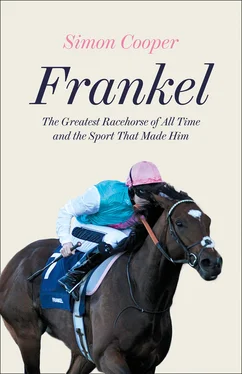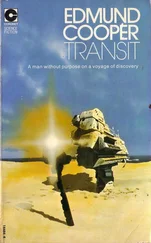She arrived at her new home at what was to be the perfect time in her life for her new calling. Though as a filly she would have been sexually mature at two, ready to breed in a wild herd, at four coming up to five she was now fully developed. And that is important for there is little point rushing these things – a healthy, well-looked-after mare will be able, accidents and difficulties aside, to produce a foal every year into her early twenties.
Her new life would have been both similar and different to that of being in training. The stables are not so different, laid out in rectangular blocks amid which the daily routine of a horse yard – feeding, grooming and light exercise – ticks on by. But the testosterone-charged young colts are absent. The highs and lows of racing success that inevitably both fire up and disappoint the stable staff are no longer present. In fact, it is noticeable that everyone is generally a generation older. They’ve done their time in the cauldron of a racing yard or come straight into the stud industry, opting for a life where the results of what you do today will be measured in the years to come rather than in the months or weeks. You sense they know they are the guardians of the future. Doing something that takes a certain care and patience.
For Kind, she has been ridden for the last time; nobody will ever sit on her back again. Nor will a bit part her mouth or a bridle be placed on her head. No saddle girths tightened around her middle. The farrier will remove her shoes; she will remain unshod until the day she dies. Gradually, she will lose the musculature of a fit racehorse as her frame fills out a little. More rounded. More feminine. Gallops are replaced with paddock life. It is, in a beautiful place, with people who care for your every need, about as perfect a life as you might imagine.
Arriving from the racecourse, Ed Murrell, then the Banstead Manor stud groom (now assistant stud manager), describes her as a ‘slab of a horse’, weighing in at a racing-fit 550 kg. Out of context that figure doesn’t mean much, but if you consider that Frankel was not much heavier, you’ll understand what a tremendously strong filly she is. It sounds a little unkind when Ed adds that she has a ‘massive behind’, but it is a statement of what Kind was: a sprinter. A mare endowed with exceptional acceleration and speed, powered by those ‘massive’ rear quarters that made her such a potent force in races of under a mile. There is not much subtlety about sprinting. Tactics are not the thing. Break fast from the stalls. Keep out of trouble. Cruise at speed in the middle section and then fire up that equine body for all it is worth once the winning post looms. In the shortest of the sprint races held in the UK and Ireland of five furlongs (five-eighths of a mile), it will all be over in sixty seconds. In understanding Frankel, you need to know how important the speed genes of Kind were. It is vital to the tale.
But all this was a little way off as Kind was let slip to run free in an empty field. For close on four years she had led the life of a prime athlete with training, conditioning and diet all focused on the single aim of making her fast. But now with Quiff, her turn-out companion, also on the way to becoming a broodmare, they explore the tiny paddock, no more than a quarter of an acre, in a remote corner of Banstead’s 379 acres. Day and night they have nothing but the skies above. Gone is the life in a stable. The daily gallops. The wind up, or the wind down, from competitive racing.
Free of all the paraphernalia of being a racehorse, bar a single head collar, they roll in the dusty turf of summer. Standing head to tail in the heat of the day, gently flicking flies from around their respective heads. At night they stare at the stars. At dawn they lick the fresh dew from the grass. Sometimes, with a sudden burst of energy, one of them will kick up heels and do a rapid circuit of the field, but for the most part little moves, fast or slow. A few times a day, one of the stud hands comes by to check all is well. They soon understand the rhythm of these visits, anticipating with remarkable precision the ones that include a bucket of feed. Sometimes, the farrier drops by to inspect their feet but it is routine; no more complicated than a pedicure.
Quiff and Kind become inseparable, even as they move to ever-larger paddocks; trusted to cope with ever-widening freedom, they stay by each other’s side day and night. If one is led away for any reason, the other stands by the gate until her partner returns. It is, in truth, a relationship deliberately nurtured by the stud as two mares of similar ages, background and breeding evolve from competition to the brink of motherhood. For we sometimes assume that animals know it all. All habits and instinct passed down through the generations by some invisible hand. But that really isn’t so. Horses, like people, learn from each other. They observe. They replicate. They take comfort from each other. As herd animals, they need each other.
But it cannot forever be summer, even in the idyll of Banstead Manor. Gradually, the chill of the late September mornings are upon us. As people don their coats for the morning commute so do Quiff and Kind of the horse kind, with light blankets that cover their backs and sides. As autumn morphs into winter, the pair are brought in at night, housed in adjacent stables still connected by way of a grilled partition between the two stalls.
But the changes to Quiff and Kind are not just confined to the daily routine. They are reverting to their natural state. The shorter days and longer nights trigger a change in their reproductive cycle which goes into abeyance. This time, the anoestrus, is a period of sexual inactivity when, in a throwback to their time in the wild, mares are not receptive to mating. If you think about it, it makes perfect sense. The gestation period for a horse is roughly eleven months, so conceiving in winter would result in a winter birth, greatly reducing the likely survival of both foal and mare. Evolution is nothing if not ingenious.
But for Ed, Mother Nature is sometimes something of an impediment to a smooth breeding programme. The difficulty is that the days of February, when the covering season starts, are just as short as November and horses are, in the jargon, long-day breeders, the ovulation cycle triggered by that and the availability of food. Strangely, temperature doesn’t have much impact which, as it turns out, is fortunate since in deepest Suffolk, though you can’t do much about the weather, you can do something about day length and food. So, without them probably even noticing, the daily routine of Quiff and Kind is subtly altered in January. Gradually, the nutrition of their feed is increased while at the same time the lights in the stable are kept on until 10 pm. Without the use of drugs or any other intervention, January is all of a sudden May.
And so it was that both Quiff and Kind were readied to lose their maidenhood. For Kind it came quickly, one of the early-season breeders, visiting Sadler’s Wells at Coolmore Stud in Ireland on 27 February. With almost impeccable promptness, she gave birth eleven months and a day later to that young foal we met on the ferry when he was just shy of three weeks old. It would be reasonable to assume that his part in the story, as simply Kind’s first foal, ends here. But racing has all sorts of interconnections and we will see, and hear, a great deal more about this horse who was to be named Bullet Train. Not only is he Frankel’s half-brother,* but he was to be involved in six races against his part sibling, including one that had an almost calamitous ending.
Back to that Irish Sea crossing, as the ferry docks in Dublin, the humans rejoin the horses. The horses, who are left alone for all the journey bar the occasional inspection, look more alert than the bleary-eyed driver and travelling groom. However often you travel the night ferry, it still manages to sap the soul. The constant dull thud of the diesel engines. The sometimes alarming hollow bang as a big wave hits the side. Travellers in uncomfortable poses stretched out on plastic bench seats. Staff in cheap white shirts and inappropriate black bow ties pushing a cloth across the counter top, trying not to think that the return trip starts again in under an hour. Through the scratched Perspex of the rain-flecked windows more orange lights illuminate a point arrival that is not much prettier than the point of departure. None of this is helped by the fact that we are still two hours ahead of an Irish February dawn. In fact, Kind and Bullet Train are probably the chirpiest on board. Life in the stall of a horse box is not so different to that in the stall of a horse barn. Admittedly it is smaller, but all the comforts of home – hay, water and warmth – are there, with the little foal suckling on his mother’s milk.
Читать дальше












